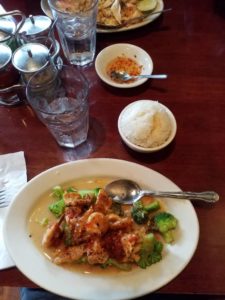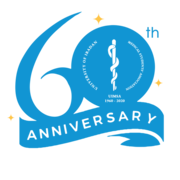So let’s assume that you finally applied and got accepted (hopefully into your desired department as well). Happy for you! You have crossed the major divide. I like to divide the necessary documents into two parts.
The first part comprises documents you submit initially while applying, before you are selected for the elective. These include your transcript, international passport, application form (provided by the institution), resumè and letter of confirmation of studentship (issued by the College of Medicine). The second set comprises documents to be submitted after you are accepted. These include your visa, proof of health insurance, proof of malpractice insurance (for some institutions), proof of HIPAA compliance (for those going to the US), travel itinerary, proof of vaccinations and serology results.
You need to send these other documents in a timely manner to finalize the process. Proof of HIPAA compliance can also be gotten after you arrive at the US. The big document here is the visa. Hopefully the host institution sends you an “acceptance letter” and a “letter to the consular officer” to support your visa application. If the institution does not send a supporting letter you should request for one. Let them know whether or not you have a visa.
You should try to schedule your visa interview as far away from the elective start date as possible, should you have to retake the interview for one reason or the other. Try to avoid making specific travel arrangements until the issue of visa is sorted out. Try to have a rehearsed set of answers for possible questions you may be asked during the interview (but don’t let these replace your intuition please!).
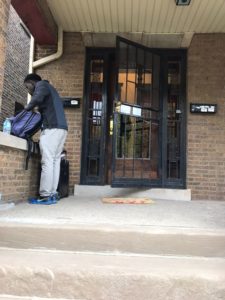
You would also need a supporting letter from the Registrar’s office at University of Ibadan for your visa interview. This usually takes less than a week to process. You can only get this letter after you are accepted for the elective (with proof e.g. an acceptance letter).
Once you have the visa, you can go ahead purchasing flight tickets and paying for your accommodation. If you are considering an elective in the US, some helpful sites for accommodation options include Airbnb and rotatingrooms.com. RotatingRooms was specifically created to help medical students on electives get relatively cheap rooms.
Try to choose a place close to the hospital so that your transport costs are reduced. If you are going with someone in your clinical group to the same hospital/ city for electives, then staying together is an excellent idea! You guys can share the costs of one room, and even if you will end up staying in different rooms, it pays a lot to have someone around that you are familiar with.

I highly recommend going with a member of your clinical group for the elective if you can. It does not have to be in the same unit or department. I had a good friend of mine, Tolu , with me during the elective. We were in the same clinical group, thus had electives at the same time. While I did mine in General Surgery at the University of Chicago Medical Center, he did his in Neurosurgery at the same hospital. We stayed in the same apartment and at end of the day would always talk about how the day went. We also went to a lot of fun places together, went shopping together, cooked nice dishes and made a couple of friends. I believe my experience would have been a lot less fun if I were alone.
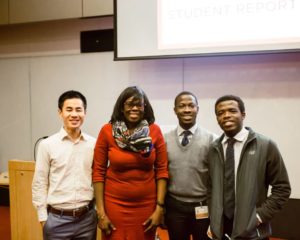
Towards the start-date of the elective, you would likely receive some more specific information from the host institution about how to navigate the area you would be staying (to and from the hospital), your supervisors, the activities for the first couple of days etc. I found it helpful to learn as much as I could about the University of Chicago Medical Center even before setting foot in the United States. By the time I got there I knew the names of quite a number of places around the hospital already. All I needed to know then was how to actually get to those places. I also got a handbook on how clinical rotations operate there, prior to travelling. This handbook, usually handed to their third year medical students, was given to me by Jim Leng, a third year medical student (now a good friend of mine) at the University of Chicago who visited the University of Ibadan as part of a Summer Research Program. It is also not a bad idea to begin to learn the differences in doctor-patient and doctor-doctor interaction that exist between our climes. You can watch videos on how to properly present patients in their format. You don’t want to go there and start doing all your things entirely differently! Watch videos on how to scrub and assist in surgical operations if you are going to be on a surgical rotation, because you will assist in surgeries! Just try to be prepared as much as possible.
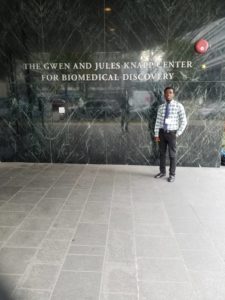
So, hopefully you are mentally prepared for the journey and the experience ahead. You are excited at what is to come. You have armed yourself with the knowledge you need to make sense during the elective. You have secured your letter of release from the Dean, College of Medicine. Just some bonus tips for the journey.
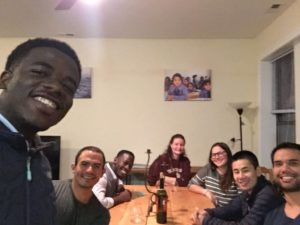
Depending on what country you are to take the elective in, there may be a considerable time-lapse between our longitudes (Nigeria and Country X). To avoid the much dreaded jet-lag (at least reduce it to the barest minimum), try to adjust your time to that of the destination country and work with that for a few days before you travel. This would go a long way in keeping you productive during the first couple of days of your elective. Read up on how to make your experience on a plane the best possible. You need to stay healthy because the next couple of days are going to be demanding. You want to be in top-notch. Try to stay hydrated. Drink a lot of clear fluids, especially if it is a long haul flight.
For those going to the US, particularly to Chicago, as I am unsure of what obtains in other states, you would do well to get a CTA (City Transit Authority) pass on arrival at the city. You would need this pass to navigate the city in perhaps the most cost-effective manner possible. Other options are to rent a car, or a bicycle while there……whatever works for you. You could also get a pass from someone that has taken the elective in Chicago before you. I figured it doesn’t cost much to get your card though.
Some tips for the elective proper. As with any rotation, punctuality is key. This means planning your day before you head out. It also means finding out the directions in advance to a place you are supposed to be at a later time. One of the first impressions you leave on people is your sense of time. My supervisors were very pleased with my punctuality. They take note of these things. Be proactive. Try to find out your activities for the next day at the close of work. When you do this, you prime your mind to prepare for the next day. You are able to properly prepare in terms of reading the necessary books/ articles as well. At the end of each day, I always made sure I looked through the schedule for the next day. If the next day was for operating room (OR) cases, I ensured I printed and took patient notes of all preop patients to my apartment. This gave me time to familiarize with the cases and read appropriate literature on the topic. Thus I always knew a lot about my patients, and this really impressed my attendings. Always ask questions if you are unsure of a thing. It’s better to ask a simple question and get clarity than risk making a costly mistake. Medical students and residents are a great resource. They are the go-to people for information about your clerkship, recommended resources, navigating the hospital, engaging in extracurricular activities etc.
Extracurricular activities are a very important part of a wholesome experience. Try to get a sim card for the country you are travelling to. This would make life a lot easier for you. Take note of the peculiarities of workplace interactions as well. Try your best to be as polite as possible and always take the initiative to help with patient care. If you could incorporate some research into the elective that would be great. I wrote a case report with my supervisor. Try your best to mix with the local student community. Attend their lectures, attend other programs that interest you. All in all, give yourself a good wholesome experience.
At the end of the elective, you would probably know for sure if the specialty you had been eyeing is really for you, because you will work in a team (if the elective is done properly). You will get to experience the work life in the country you visit. This is especially important if you want to do residency or end up settling in that country. You get to know if that is something you really want, or if it was just a fantasy. You can get letters of recommendation too.
Establish critical connections (never know when they will be needed). In the end it’s all about what you learn from the experience, so cherish that above all else. It’s a good idea to buy thank you cards or other gifts for your supervisors after the rotation. Of course, get contacts and keep in touch. An elective abroad is one of those once-in-a-lifetime experiences, so cherish it. Enjoy your elective!
